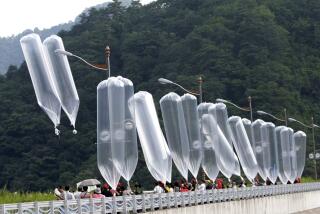Smoldering memories of the war in Korea
- Share via
ABOUT the last thing I wanted was to write about the Korean War again, so I set aside a documentary sent to me some time ago and pretty much forgot about it. Human conflict, as a memory, is best left in dark corners.
But then along came that declared nuclear test on the troubled peninsula, and suddenly Korea is in the headlines again, triggered into suicidal prominence by the madness of the North’s Kim Jong Il.
Dangerous rhetoric is ramping up and the winds of war, as Nehruonce called them, are blowing through Asia, hot and dry and deadly. Warnings have gone unheeded and accusations have called armies to red alert. One wonders: Now what?
Diplomacy has proved to be one of America’s lesser talents, weakening our outrage against North Korea for violating the wishes of the global community when we, by charging into Iraq, pretty much did the same.
I sit in my place of contemplation, our sunlit gazebo, thinking about all of this and wondering if there will be war again between the culturally ravaged North, possessor of one of the world’s largest standing armies, and the South, a miracle of economic success. If so, we are committed by moral obligation to once more march to the fray.
The concern this time, however, is not army facing army over the ragged mountains and through the broad valleys but that the battle will be nuclear, drawing the whole world in by the consequence of the resultant radiation. Few would be spared.
We would hope that a way out of the dilemma could be found before the first shot is fired across the demilitarized zone, but a quick resolution doesn’t seem to be in the offing. More than 50 years after a cease-fire that ended the fighting in Korea, the war has never been officially declared over. A fist is still poised in the air.
I dug out the documentary “Korea: We Call It War,” which was sent to me long ago by someone who knew I had been there: a skinny young Marine who had gone to battle as a boy and come home aged by pain and horror. I don’t even recall the name of the person who sent the cassette -- possibly the producer, John Gilbert.
It is not the kind of documentary one is likely to find in competition for any kind of prize, and I doubt that it will ever show up on television, even during the dead hours of a Sunday pre-dawn.
Despite its power, it just isn’t that cohesive or compelling but rather like a page in a history book that means very little to those reading it.
Having said that, for me it is a wrenching memory of what America’s forgotten soldiers endured physically and mentally in a war that hardly anyone noticed. Even the president of the United States dismissed it at the time, at least verbally, as a “police action.”
The film is mostly in black and white, which makes it all the more real to me. The war and the fields upon which it was fought were the dull gray that the images project, except for the winter when the world was wrapped in snow, all the better to show the blood that ran like ribbons of red through the gleaming white.
The fighting and the dying are interspersed by the comments of the men, now old, who were there, some brought to tears by remembering the good friends, their bonds forged by combat, whose lives were left along the ravaged peninsula either by the blast of an exploding mortar shell or by a sniper’s single bullet.
Memory imposed scenes of my own on those I was watching, images working like an overlay, one upon the other. During battle a warrior moves by instinct and training, rarely by heroics, and fear is represented in equal proportion to determination on the faces of the young men called to the conflict. We didn’t want to be afraid, but we were. We didn’t want to die, but we knew it was possible.
I remember bits of a poem supposedly written by a Marine and carried by many of us in combat: “Thy will be done if thou decree that I should die afield; Then let me go, face to the foe, sustain me lest I yield.” We didn’t want to yield. And we didn’t. Such is the temperament of the soldier striding into machine-gun fire.
So here I am writing about that damned war again, its subject once more new, separated by half a century from the terrors that still make me wary on a hike through a forest, watching for land mines; or tense as twilight comes, remembering when a diffused light hid the deadly presence of an enemy moving toward me with the stealth of a shadow. I stop. I listen. Finally, I move on, and the memory moves with me.
We are at the mercy of power, hubris and madness once more over the Korean peninsula. They move together like the linkage in a nuclear force, and I fear the explosive potential that the final union can produce. Fires still burn in the war that has never ended.
Al Martinez’s column appears Mondays and Fridays. He can be reached at al.martinez@latimes.com.
More to Read
Only good movies
Get the Indie Focus newsletter, Mark Olsen's weekly guide to the world of cinema.
You may occasionally receive promotional content from the Los Angeles Times.









